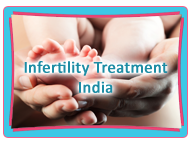Quick Enquiry
Apollo Fertility and IVF Center
The Apollo Fertility and IVF center offers the full range of Assisted Reproductive Technology (ART) services to help a patient bear a child. A successful outcome in infertility treatment with minimum invasion is the priority of the Apollo Fertility and IVF center.
In all branches of medicine both patients and doctors recognize that the same symptoms may have different causes and that accurate diagnosis should always come before treatment. This is no less true when the symptom is the "inability of the couple to have a baby (infertility)". Therefore before you start infertility treatment we recommend you have a proper examination so that we can give you better advice regarding the treatment options and help you decide the most appropriate treatment for you.
Steps involved in IVF Procedure:
- Ovarian stimulation by hormonal injections to produce multiple eggs
- Monitoring of the response by ultrasound scans and blood tests
- Egg retrieval with the help of a needle under local / general anesthesia
- Fertilization of the eggs in laboratory
- Transfer of the resulting embryo(s) into the uterus of the woman
Blood test performed 15 days after embryo transfer, to assess the establishment of pregnancy. If the treatment procedure is successful, one or more of the embryos will implant in the uterus and pregnancy will result, just as it happens in the natural process of conception.
Intra Cytoplasmic Sperm Injection (ICSI): ICSI is the technological breakthrough in the field of IVF, which is used to overcome the inability of sperm to fertilize an egg. In this technique a sperm is directly injected into the cytoplasm of an egg in order to achieve fertilization. The steps involved in ICSI procedure are exactly the same as for IVF, except that fertilization is achieved with the help of a micromanipulator. In some cases where there is a complete absence of sperm in the ejaculate, sperm can be retrieved from the testis / epididymis and used for ICSI. The testicular / epididymal sperm retrieval techniques are: PESA (Percutaneous Epididymal Sperm Aspiration), MESA (Microsurgical Epididymal Sperm Aspiration), TESA (Testicular Sperm Aspiration), TESE ((Testicular Sperm Extraction)
IVF using Donor Oocyte (Eggs): Women who are unable to produce their own eggs or whose eggs fail to fertilize during an IVF cycle due to poor Oocyte quality, can be helped by using other women's eggs (Donor Oocyte). Replacement of donor embryos and surrogacy are other options available to the infertile couple.
Assisted Hatching: The procedure is based on the fact that an alternation in the zona pellucida (outer covering of the egg) either by drilling a hole through it or by thinning it, will promote hatching or implantation of embryos that are otherwise unable to escape intact from the zona pellucida.
 Cryo Preservation of Embryos: Excess (Surplus) Embryos can be cryo-preserved at ultra low temperatures for many years. These frozen embryos can be used subsequently without the need for ovarian stimulation and egg retrieval. However the pregnancy rate following transfer of frozen embryos is lower than that with fresh embryos.
Cryo Preservation of Embryos: Excess (Surplus) Embryos can be cryo-preserved at ultra low temperatures for many years. These frozen embryos can be used subsequently without the need for ovarian stimulation and egg retrieval. However the pregnancy rate following transfer of frozen embryos is lower than that with fresh embryos.
Semen / Sperm Freezing: Semen/ Sperm or testicular biopsies can be stored frozen at ultra low temperatures for a long duration for future use or analysis.
Semen Bank: The Apollo hospital has its own semen bank. The bank contains frozen sperm from voluntary donors, with various backgrounds and physical characteristics to match individual needs. Donors are screened thoroughly to rule out any transmission of infectious or genetic diseases.
Risks Involved
- Multiple pregnancy
- Ovarian Hyperstimulation Syndrome (OHSS)
- Failure at different steps of IVF Treatment
- Ectopic pregnancy
- The incidence of congenital malformation in IVF babies is no more than in the general population.
Success Rate
Apart from the expertise of the individual fertility clinic there are other factors, which affect the ART outcome, such as patient's age and the variety of abnormalities, causing infertility. Some of these abnormalities respond well to IVF while others do not. This means that some patient will have a good chance of pregnancy while others will have a poor chance. At present the Apollo Hospital has a 30 - 40 % pregnancy rate per attempt.
Treatment Options Available
- Ovulation induction / controlled ovarian stimulation
- Intrauterine Insemination (IUI) Husband / Donor
- In Vitro Fertilization (IVF) and Embryo Transfer
- Intra Uterine Cytoplasmic Injection (ICSI)
- Gamete Intra Fallopian Transfer
- Sperm Retrieval techniques -
- TESA (Testicular Sperm Aspiration),
- TESE (Testicular Sperm Extraction),
- MESA (Microsurgical Epididymal Sperm Aspiration),
- PESA (Percutaneous Epididymal Sperm Aspiration)
- Sperm Bank
- Donor Oocyte Program
- Donor Embryo Program (genetic surrogacy)
- Blastocyst Culture
- Assisted Hatching
| GYNAECOLOGY | Estimated Tariff (US $) | Estimated Tariff (UK £) | DURATION OF STAY |
|---|---|---|---|
| Laproscopic Surgeries | 2950 | 1400 | 2 - 5 Days |
| Histroscopic Surgeries | 2750 | 1325 | 2 - 3 Days |
| Melignancy Surgeries | 4800 | 2300 | 3 - 5 Days |
| Urine Tumours | 3 - 6 Days | ||
| IVF | 5450 | 2600 | OPD |


























